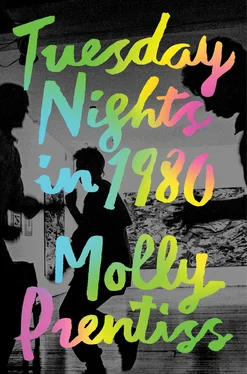EARS: If you had to describe this song, how would you describe it? The song of setting foot onto such dirty new concrete, the song of the soaring buildings, the song of looking upward, following a bird out of the thicket of metal and through the portal of blue sky. How would you describe this song, young, unknown man? You’d need eighteen musicians, surely. You’d need expectant, vibrating buildup. You’d need a genius composer, smart enough to capture what should not be allowed to go undocumented: this frequency of pure, unfettered hope.
FEET: It feels like running away, says an overheard voice, pumping to the rhythm of the music at a not yet familiar nightclub. What does? says another voice. Manhattan, says the first voice, and the island’s name sounds like wheeeeeee!
LIMBS: From above, Manhattan is just a lonely arm, squirting and bending from the big body of Brooklyn. It is not until you are inside it that you see it is the vital appendage, the hand that squeezes at the rest of the world, the muscle where everything that’s anything is made.
MOUTH: Come on in, the water’s fine! The water’s not fine but there’s always wine. There’s always a taxi when you need one, except when you look like you need one. There’s a shitload of everything for sale. HOT DOG, HOT DOG, COCA-COLA, PRETZEL. People are dancing in Tompkins Square Park. Watch their mouths turn into O’s and their bodies turn into S’s. Come on in, the water’s fine! This is what the bouncer at Max’s says, but only when you’re on the list. If you’re not on the list, go take a piss. The guys in the band wear skinny ties and combat boots. There’s an art project on the sidewalk, on the fire escape, in the back bathroom. Somebody’s crawling through a gallery on his hands and knees, moaning. This is a project. Somebody’s talking shit about Schnabel. This is a project. Somebody’s mouthing the words to that song everybody’s listening to: You’re just a poor girl in a rich man’s house, ooh, ooh, ooh, ooh, ooh! This, too, is a project. Come on in , mouths the bouncer’s sour mouth. Someone’s making a scene tonight, and you’re about to be a part of it.
FACE: No one recognizes you here. Immediately, you want them to.
Winona George’s apartment was exotic in a way that only a New Yorker would understand. A downtown New Yorker. In 1979. This is what James Bennett professed to his wife, in a spousal whisper, as they embarked on a night within the apartment’s confines: Winona George’s annual New Year’s Eve party, their first time in attendance. Was it an old schoolhouse? Marge wanted to know. A convent, James said. The sleeping floor of a city convent that retained none of its convently attributes, namely humbleness, sparseness, or quiet. Winona had, in the way of so many wealthy downtowners, transformed the nontraditional space completely, both blasting it with bohemianism (rugs from Fez, lanterns, shells full of candle wax), and cutting it with classic luxury (there was a chandelier in every room). It was something old made new, made old again, which then made it new again. The effect was charming when it was not confusing.
James and Marge had gotten there quite late, and there was only an hour or so before it became 1980. It was the sort of party they usually avoided, Marge because she didn’t think they belonged —due to such factors as gross household income and gross (as in the other kind of gross) household wardrobe options. (James’s white suit, Marge had not failed to remind him before they left, still had that black stain on the back, from when he had accidentally sat on a spot of Lawrence Weiner’s paint while watching him stencil onto a white wall: LEARN TO READ ART.) James agreed, but for other reasons, the primary being inevitable overstimulation. It would have been overstimulating for anyone, James guessed, as places with excessive wealth and excessive art and excessive alcohol usually were, but it was especially overstimulating for James, whose mind flashed with nearly psychotic colors and sounds immediately upon entering.
First and foremost there was the purple, which was the color of money — not one-dollar bills and loose-change money, but big money, and the people who had it. Mansions were purple, and expensive cars, and the towers made of glass that reflected the sun off the Hudson. Certain haircuts were purple, and certain names. Yvonne. Chip. Anything preceding Kennedy. Winona George herself was in the lavender family; her personal art collection included a Gaudí spire that had mysteriously been procured from the actual Sagrada Familia, and not one but two de Koonings.
James could sense Winona’s presence almost immediately; he saw her at practically every art opening he went to, knew her color and smell by heart, though he’d rarely had to deal with her face-to-face; she always seemed so busy. Now she flew around the mahogany room like a loon in her black silk dress, coating everything and everyone with flirtatious art babble and lilac laughter. The babble itself — overwrought with intellectual tropes, heavy with important names, dripping with references that only a crowd like this one would understand ( Fluxus, metarealism, installation ) — affected James in a bodily way, with the physical feeling that he was being sprayed in the face with a garden hose. The paintings and sculptures that filled Winona’s house, each with its own intense flavor or smell, flew at him from all directions; a comforting but powerful red color was being emitted by his wife; and then there was the matter of the grating chorus of violins: teeth pulling hors d’oeuvres from tiny toothpicks.
It was indeed overwhelming, but tonight James was choosing to indulge in it. Today he had received dual pieces of good news: that he had been invited to give an important lecture — at his alma mater, Columbia, on the importance of metaphor in art writing — and that, tucked under his wife’s burgundy dress and stretched skin like a ripening fruit, there was a real, live human with a real, beating heart. Both of these things — recognition from the institution that had given shape to his life, along with the confirmation via a sixteen-week sonogram that he was really and truly about to give shape to another life — were causes to celebrate. They were finally past that precarious point of not being able to tell anyone about the baby, so why not? Why not go tell the world, and celebrate with them? There was no way to know then that it would be the last celebrating they did for a very long time, that those hours, suspended like a sack of happiness just before that happiness would dissolve, would mark that night with an X for years afterward: the night just before the morning when everything would change.
But for now, in Winona George’s Moroccan-rugged and morosely lit convent living room, James and Marge were happy. And when Winona herself approached them, instead of recoiling as he might have on another, less buoyant evening, James was armed with confidence and charisma.
“Meet my wife!” he shouted proudly to Winona, a little too loudly he knew, for he always had trouble gauging the appropriate decimal at which to speak at parties. “And our kid!” He said while stroking Marge’s barely noticeable stomach through her dress. “Meet our kid! We’re just telling people.”
“Oh how lovely ,” said Winona, with pursed purple lips. She had the kind of hair that was popular that year, a curtain revealing only the first act of her face: a queenly nose, confusingly colored eyes (were they violet ?), cheekbones for days. “And how far along are you?”
“Sixteen weeks today,” Marge said. And James loved the way she said it — already living with a new mother’s understanding of time, where weeks were the only measurement of time that counted — with red beams coming out of her eyes like pretty lasers.
Читать дальше












